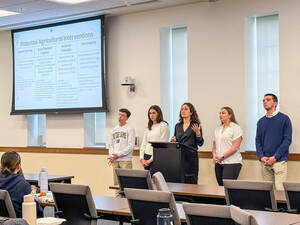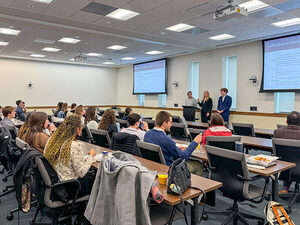
Research Teams present research,
April 2024.
A new research program pioneered at the University of Notre Dame helps students apply the knowledge they learn in the classroom to solve major health challenges.
The Global Health Student Research Teams (GHSRT) program began in Fall 2023 and uses a new approach to provide a transformative learning experience where increased exposure to experiential activities can encourage students to further develop their critical thinking and problem-solving skills. The programs also offer guidance in ethically conducting research through a collaborative model.
The program is available to all members of the Eck Institute for Global Health’s Global Health Club of Notre Dame, and connects undergraduate students with team-based research projects, allowing them to collaborate with peers, faculty from across the University, and community partners to address topics such as maternal health, pesticide interventions, and child nutrition.
Nydia Morales-Soto and Marian Botchway, assistant directors of the Eck Institute for Global Health and co-advisors for the club, initiated the program in response to numerous student requests for research opportunities. They worked with Notre Dame principal investigators and community partners to identify how student teams could meaningfully contribute to ongoing research.
John Riehl, a student majoring in Global Affairs, worked with Elizabeth Wood, associate professor of the practice at the Eck Institute for Global Health, and four other team members to investigate interventions that could potentially reduce harmful pesticide use in Ethiopia.

“Having teammates from different departments and colleges that could collaborate to identify various interventions allowed the research to develop in ways that would not have been possible if I was working on this project alone, he says. The team’s research demonstrated that the negative impacts of heavy pesticide use, including a decline in natural pollinators, cancer, and death must be mitigated with comprehensive interventions. “Our team's research was made possible by interdisciplinary perspectives into one another's research,” he adds.
Wood, who is also the director of the Master of Science in Global Health, says she is thrilled to share the insights from the project with local Ethiopian partners. “Given the breadth of this topic area and how it transcends so many different disciplines, I have been impressed by the knowledge exchanged within the research team that has driven the development of agricultural, educational and social interventions, she says.
The GHSRT program also partners with the local community to improve health in St. Joseph County.
“The students that I worked with not only contributed a multidisciplinary approach, but they proposed incredibly creative next steps including the development of focus groups for B.A.B.E. clients and the digitization of materials that can work towards the sustainability of the B.A.B.E. Store’s services,” says Cassy White, manager of community health outcomes for Beacon Community Health Impact. White teamed with students from a second group to enhance the sustainability of the B.A.B.E. Store, which provides incentives and resources for expectant mothers to encourage positive health outcomes.
“Our group really felt as though we have been able to make a truly tangible impact here in our local community,” says Charlotte Burke. Burke, a rising junior who is studying is studying Psychology with a minor in Global Health. “The experience has also been such a great way to engage in real-life research and has exposed us to many of the true struggles and successes when it comes to conducting research in the community,” she shares.
In April, the first GHSRT cohort presented their projects to University faculty, staff, community partners, and other students of the Global Health Club of Notre Dame.
“The University has a longstanding tradition of excellence in undergraduate education. In alignment with the 2033 Strategic Framework, the Eck Institute for Global Health is strengthening this investment by facilitating more opportunities for undergraduate students to engage in research,” says Dr. Bernard Nahlen, Director of the Eck Institute for Global Health, who is also a professor in the Department of Biological Sciences. “We look forward to seeing this program expand and encourage all faculty, staff, and students who are interested in collaborating on global health challenges to reach out to the Eck Institute.”
Opportunities for additional cohorts are forthcoming. Students who are interested in applying for the GHSRT program can learn more by visiting the Eck Institute for Global Health website. Applications will reopen in the fall of 2024.
For investigators interested in becoming research advisors or to learn more about ways to support the GHSRT program, please contact Nydia Morales-Soto.
Contact:
Christine Grashorn, Communications Specialist
Notre Dame Research / University of Notre Dame
cgrashor@nd.edu / 574.631.4856
research.nd.edu / @UNDResearch
About the Eck Institute for Global Health
The Eck Institute for Global Health (EIGH), an integral part of Notre Dame Research, builds on the University’s historical strength in infectious disease research, including vector-borne diseases, while broadening the interdisciplinary expertise into other key global health areas including maternal, newborn, and child health (MNCH); community health; mental health; nutrition and non-communicable diseases; the environment and health; health analytics and technologies; and health systems and organizations. Our team of interdisciplinary researchers and their students holistically address health disparities around the world. EIGH faculty affiliates recognize health as a fundamental human right and promote research, training, and service to advance health standards for all people, especially those in resource-poor countries who are disproportionately impacted by preventable diseases. The EIGH is training the next generation of global health researchers and leaders through undergraduate, Master of Science in Global Health, doctoral, and postdoctoral programs.
Originally published by at globalhealth.nd.edu on July 17, 2024.